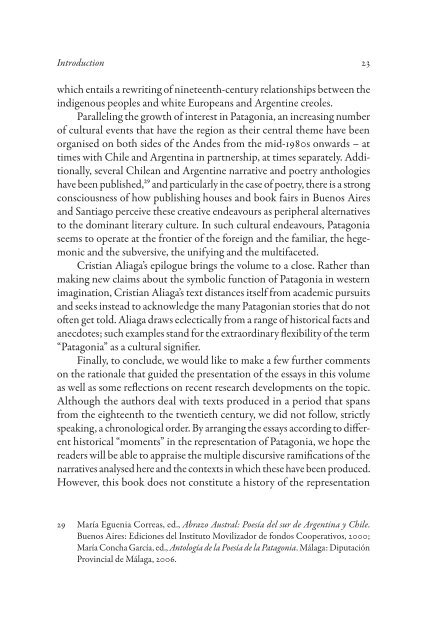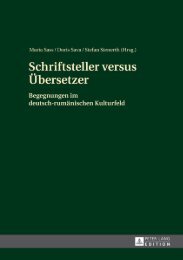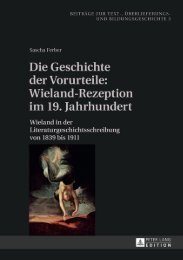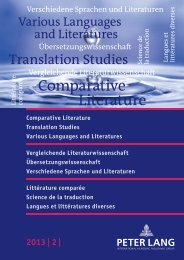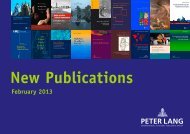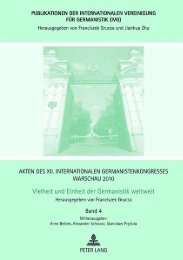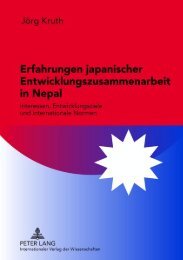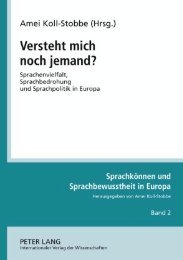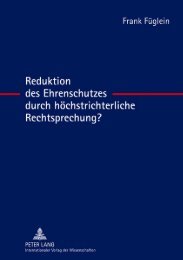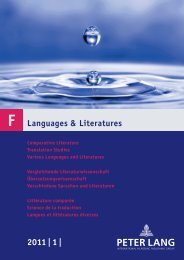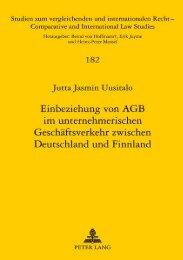Extract (PDF) - Peter Lang
Extract (PDF) - Peter Lang
Extract (PDF) - Peter Lang
Create successful ePaper yourself
Turn your PDF publications into a flip-book with our unique Google optimized e-Paper software.
Introduction 23<br />
which entails a rewriting of nineteenth-century relationships between the<br />
indigenous peoples and white Europeans and Argentine creoles.<br />
Paralleling the growth of interest in Patagonia, an increasing number<br />
of cultural events that have the region as their central theme have been<br />
organised on both sides of the Andes from the mid-1980s onwards – at<br />
times with Chile and Argentina in partnership, at times separately. Additionally,<br />
several Chilean and Argentine narrative and poetry anthologies<br />
have been published,29 and particularly in the case of poetry, there is a strong<br />
consciousness of how publishing houses and book fairs in Buenos Aires<br />
and Santiago perceive these creative endeavours as peripheral alternatives<br />
to the dominant literary culture. In such cultural endeavours, Patagonia<br />
seems to operate at the frontier of the foreign and the familiar, the hegemonic<br />
and the subversive, the unifying and the multifaceted.<br />
Cristian Aliaga’s epilogue brings the volume to a close. Rather than<br />
making new claims about the symbolic function of Patagonia in western<br />
imagination, Cristian Aliaga’s text distances itself from academic pursuits<br />
and seeks instead to acknowledge the many Patagonian stories that do not<br />
often get told. Aliaga draws eclectically from a range of historical facts and<br />
anecdotes; such examples stand for the extraordinary flexibility of the term<br />
“Patagonia” as a cultural signifier.<br />
Finally, to conclude, we would like to make a few further comments<br />
on the rationale that guided the presentation of the essays in this volume<br />
as well as some reflections on recent research developments on the topic.<br />
Although the authors deal with texts produced in a period that spans<br />
from the eighteenth to the twentieth century, we did not follow, strictly<br />
speaking, a chronological order. By arranging the essays according to different<br />
historical “moments” in the representation of Patagonia, we hope the<br />
readers will be able to appraise the multiple discursive ramifications of the<br />
narratives analysed here and the contexts in which these have been produced.<br />
However, this book does not constitute a history of the representation<br />
29 María Eguenia Correas, ed., Abrazo Austral: Poesía del sur de Argentina y Chile.<br />
Buenos Aires: Ediciones del Instituto Movilizador de fondos Cooperativos, 2000;<br />
María Concha García, ed., Antología de la Poesía de la Patagonia. Málaga: Diputación<br />
Provincial de Málaga, 2006.


